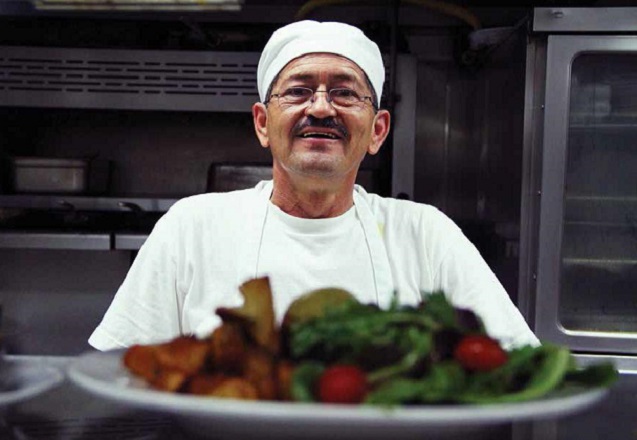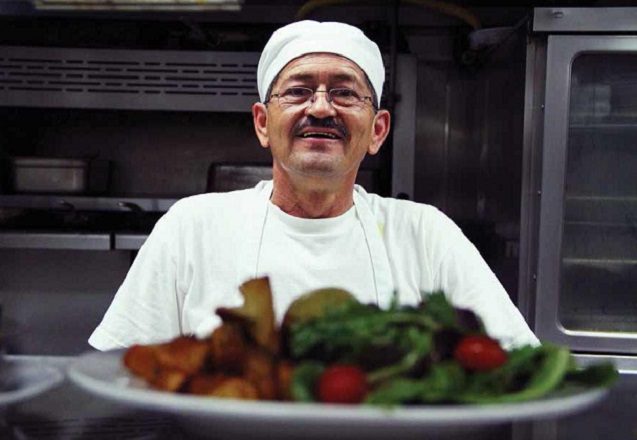
Part of the Series
Harvesting Justice
 The head chef at a restaurant in Hollywood. This photo was part of the Restaurant Opportunities Center’s (ROC) photo exhibit, “107 Stories: Through Restaurant Workers’ Eyes.” With over 8,000 members, ROC is leading the growing movement for fair wages and rights for restaurant workers throughout the country. (Photo: © Kellee Matsushita, Brave New Seed Photography)
The head chef at a restaurant in Hollywood. This photo was part of the Restaurant Opportunities Center’s (ROC) photo exhibit, “107 Stories: Through Restaurant Workers’ Eyes.” With over 8,000 members, ROC is leading the growing movement for fair wages and rights for restaurant workers throughout the country. (Photo: © Kellee Matsushita, Brave New Seed Photography)
The Food Chain Workers Alliance has a goal of nothing less than full rights and fair wages for the 20 million workers who grow, harvest, process, pack, ship, cook, serve, and sell food in the US. Begun in 2009, the Alliance brings together 18 organizations representing workers throughout the food supply chain. It is organizing across sectors, building solidarity between workers in different industries. It is pushing for policy changes and educating and activating consumers so that we can all better align our food purchases with our principles. The Alliance also draws attention to the ways in which institutional racism in the US and around the world has produced a food system reliant on the exploitation of immigrants and people of color.
The Restaurant Opportunities Center (ROC) is one of the founding members of the Alliance. Started in New York City, the organization’s original aim was to help find new jobs for workers who had been employed at Windows on the World, the restaurant on the 107th floor of the World Trade Center that collapsed on September 11, 2001. This mission quickly expanded to changing working conditions throughout the entire restaurant industry. In 2008, a national office, ROC United, was launched, which has since helped replicate the model in eight other places: Chicago, Los Angeles, Miami, Michigan, New Orleans, Philadelphia, Washington, D.C., and Houston.
“The restaurant industry is the largest private sector employer in the US,” said Jose Oliva, ROC’s national policy coordinator. “It is in the position of creating the conditions, setting the tone, setting the standard, for the entire sector, not just the service sector which has now become the core of our new economy, but for the entire private sector.” If food workers could exercise their power, added Jose, they could improve not only their own working conditions but also other aspects of the food system, from environmental impacts and animal rights to food quality for consumers.
ROC has won numerous campaigns against unjust restaurants, forcing them to change their practices. Their current campaign focuses on the world’s largest full-service restaurant group, Darden, which owns Capital Grille, Red Lobster, Olive Garden, Longhorn Steakhouse, and others. In 2012, ROC filed a lawsuit against the company for racial discrimination and wage theft.The organization is also leading a charge to raise the federal minimum wage for tipped workers, which has been frozen at $2.13 for more than 20 years. Over the years, ROC has led and won 13 campaigns against exploitation in high-profile restaurant companies, securing improvements in grievance procedures, raises, sexual harassment policies, sick days, job security, and anti-discrimination policies.
ROC is also making the public aware of what happens behind the scenes at restaurants. They have published in-depth reports and a new book, Behind the Kitchen Door, about working conditions, racism, and sexism in the industry.
Other compelling initiatives for food workers’ rights include:
* Dining workers are demanding better wages and working conditions on more than 100 college campuses in the US and Canada as well as at corporate cafeterias, airports, stadiums, event centers and other institutions. Part of the Real Food Real Jobs campaignof the union UNITE HERE, these food service workers are building union power across sectors and geographies. And, they are building bridges of solidarity with university students and faculty to add strength to their campaigns and win better contracts.
* The organization Just Harvest focuses on bridging the gap between the sustainable food movement and the farmworker rights movement. Just Harvest is reaching out to all those concerned about local and healthy food – including food co-ops, CSAs, farmers’ markets, organic producers and consumers – to bring forth the piece most often left out of the sustainability equation: labor wages and conditions for farmworkers. Just Harvest works to educate the public and mobilize support from different sectors such as students and consumers for food- and farm-worker justice campaigns. They are currently supporting the Coalition of Immokalee Workers (CIW) in their campaign targeting Wendy’s.
* A new certification, called Magen Tzedek or Seal of Justice, is now available to kosher producers that meet criteria regarding workers’ rights, environmental impact, and animal welfare. Kosher foods are those sanctioned by Jewish law, based on a set of standards for how they are processed and prepared. In 2006, after a report that the nation’s largest kosher meatpacker, Agriprocessors Inc., was violating workers’ rights, Jewish leaders began creating the new certification. “As concerned as we are about how an animal gets killed, we need to be equally concerned about how a worker lives,” says Rabbi Morris Allen, a leader in the certification effort. The kosher food industry has sales of $11.5 billion annually, so a shift in practices could have widespread ramifications on the entire food supply chain in the US.
* People are challenging the organic industry to step up to a higher standard in respecting workers’ rights. Organic certification in the US is regulated by the USDA and currently does not address labor rights. Organizations like the Agricultural Justice Project are creating domestic fair-trade labels, meaning the company or farm must meet standards regarding fair wages, freedom of association, workplace health and safety, and farmworker housing. Other groups like the Domestic Fair Trade Association and the Organic Consumer Association’s Fair World Project are playing a monitoring role, making sure certification programs uphold the standards that they profess.
* Immigrant farmworkers are, in some instances, starting up their own farming operations. Many have the necessary agricultural experience but lack the funds to buy or rent land, and are unfamiliar with US markets. A series of programs across the US are offering small pieces of land, “incubator farms,” on which immigrants can start their businesses. The programs provide access to training, loans, and equipment. The Agriculture and Land-Based Training Association (ALBA) in California and the New Entry Sustainable Farming Project in Massachusetts, as two examples, hold courses on the ins and outs of running a farm. Graduates of those classes can lease land far below market rate and get technical assistance.
Here are some ways you can support food, farm, and restaurant workers organizing for better working conditions:
• Stay in touch with the Food Chain Workers Alliance “Take Action” page;
• Participate in the campaigns of the Restaurant Opportunities Council (ROC) for a higher minimum wage for tipped workers and for better working conditions.;
• Research how certain businesses, restaurants, and corporations treat their workers and choose your patronage accordingly. If you live in New York City, ROC has done your work for you; see their diners’ guide, If You Care, Eat Here,to learn about conditions in restaurants in the city;
* Join boycotts and hold solidarity protests for farmworkers rights. Check out the Coalition of Immokalee Workers, the United Farm Workers, and the Farm Labor Organizing Committee to learn about their current campaigns;
• Join efforts to bridge healthy and local-food movements with the farmworker rights movements. Just Harvest USA tells you how;
• Get to know the workers in your life. Offer respect and generous tips at restaurants. Find out how the institutions you are a part of treat their workers, and if workers are organizing, ask how you can support their efforts.
This article has been amended to reflect the correct number of organizations in the Food Chain Workers Alliance.
Download the Harvesting Justice pdf here, and find action items, resources, and a popular education curriculum on the Harvesting Justice website. Harvesting Justice was created for the US Food Sovereignty Alliance, check out their work here.
Read more from Other Worlds here, and follow us on Facebook and Twitter!
Copyleft Other Worlds. You may reprint this article in whole or in part. Please credit any text or original research you use to Tory Field and Beverly Bell, Other Worlds.
Angry, shocked, overwhelmed? Take action: Support independent media.
We’ve borne witness to a chaotic first few months in Trump’s presidency.
Over the last months, each executive order has delivered shock and bewilderment — a core part of a strategy to make the right-wing turn feel inevitable and overwhelming. But, as organizer Sandra Avalos implored us to remember in Truthout last November, “Together, we are more powerful than Trump.”
Indeed, the Trump administration is pushing through executive orders, but — as we’ve reported at Truthout — many are in legal limbo and face court challenges from unions and civil rights groups. Efforts to quash anti-racist teaching and DEI programs are stalled by education faculty, staff, and students refusing to comply. And communities across the country are coming together to raise the alarm on ICE raids, inform neighbors of their civil rights, and protect each other in moving shows of solidarity.
It will be a long fight ahead. And as nonprofit movement media, Truthout plans to be there documenting and uplifting resistance.
As we undertake this life-sustaining work, we appeal for your support. We have 10 days left in our fundraiser: Please, if you find value in what we do, join our community of sustainers by making a monthly or one-time gift.